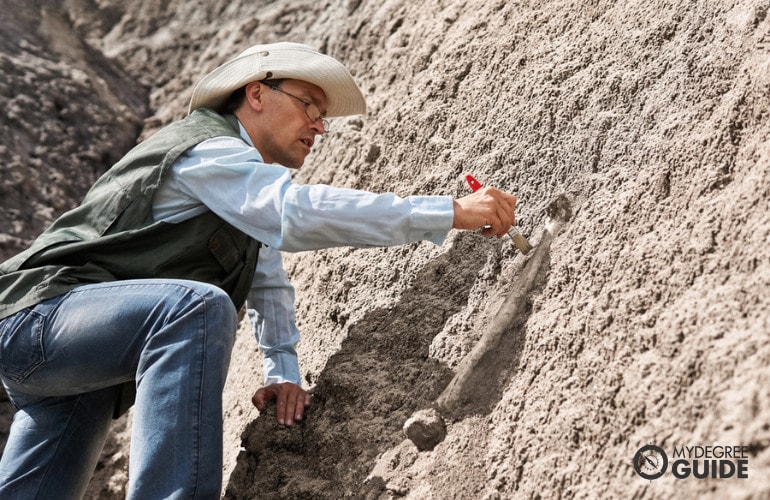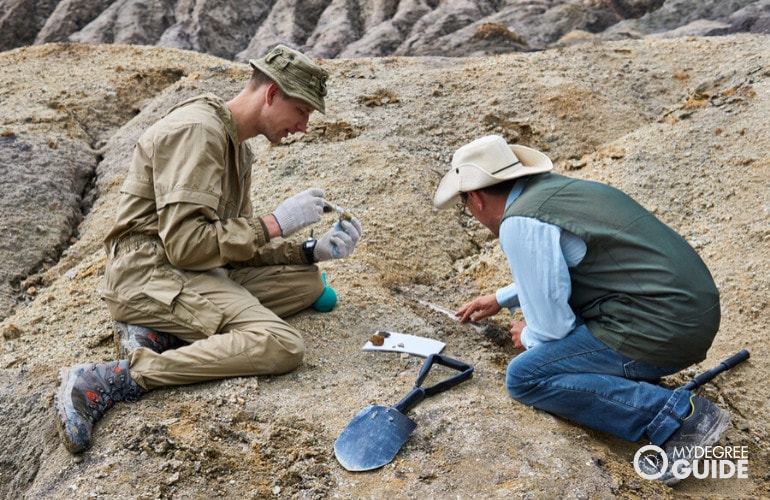If you’re interested in learning about the evolution of the human species and developing a better understanding of human behavior, then you might consider enrolling in an online masters in anthropology program.

Master’s in anthropology online programs allow you to explore different facets of the field, from cultural norms of individual societies to the biological and physical development of human brains.
Editorial Listing ShortCode:
Anthropology graduate programs can also help you qualify for positions across different industries. The potential opportunities are broad and far-reaching, from social work and public health to research and archeology.
Universities Offering Online Masters in Anthropology Degree Programs
Methodology: The following school list is in alphabetical order. To be included, a college or university must be regionally accredited and offer degree programs online or in a hybrid format.
Bob Jones University
Bob Jones University offers a Master of Arts in Intercultural Studies program that focuses on courses in theology and culture. Classes can be taken online or in the evening or live-streamed. To graduate, students must complete a minimum of 44 credit hours. Those interested in the program must apply online through the school’s website.
Bob Jones University is accredited by the Southern Association of Colleges and Schools Commission on Colleges.
Eastern University
Eastern University offers a Master of Arts in Theological and Cultural Anthropology. The program can usually be completed in 11 months when studying full-time and online. To be eligible for the program, applicants must have a minimum GPA of 2.5 and a Cultural Anthropology credit with a grade of C or higher.
Eastern University is accredited by the Middle States Commission on Higher Education.
Evangel University
Evangel University offers a Master of Arts in Intercultural Studies. To graduate, students must complete 48 credit hours.
The program is designed to prepare students to act as ministers in domestic and foreign contexts. Applicants must submit official transcripts from all postsecondary schools attended, ministerial and academic references, and an autobiography.
Evangel University is accredited by The Higher Learning Commission.
Harvard University
Harvard University offers an Anthropology and Archaeology graduate program. The program can be completed online with students taking 1 or 2 courses a semester. To be eligible for the program, applicants must have a bachelor’s degree with a GPA of 3.0 or higher from all courses required for admission.
Harvard University is accredited by the New England Commission of Higher Education.
Humboldt State University
Humboldt State University offers a Master of Arts in Anthropology. Students may choose to add an emphasis or specialization in four different areas, including Archaeology. A thesis must be defended to graduate. Applicants must have a BA or BS in a relevant field with a GPA of 3.0 or higher. GRE scores are not required but accepted.
Humboldt State University is accredited by the WASC Senior College and University Commission.
Liberty University
Liberty University offers a Master’s in Global Studies online program. Students must complete 36 credit hours to graduate, and the program can often be completed in 1.5 years. Each course is 8 weeks long. To be eligible for the program, applicants must have a GPA of 2.0 and need to submit official college transcripts when applying.
Liberty University is accredited by the Southern Association of Colleges and Schools Commission on Colleges.
Ohio University
Ohio University offers an online program for a Master of Social Sciences. Students must complete 8 courses to graduate, and students can often finish the program in 18 months. Those interested in the program must apply online and have an undergraduate GPA of 3.0 or higher. GRE scores are not required.
Ohio University is accredited by the Higher Learning Commission.
Portland State University
Portland State University offers a Master’s in Anthropology. The online program requires students to complete a minimum of 48 credit hours to graduate. Those interested in the program may apply online. To be eligible, applicants need to have a cumulative minimum GPA of 3.0, a GPA of 3.25 from all anthropology courses, and GRE scores.
Portland State University is accredited by the Northwest Commission on Colleges and Universities.
University of Maryland
The University of Maryland offers a graduate program in Cultural and Heritage Resource Management. The online program requires students to complete 10 courses in 2 years to graduate. A thesis and an internship are required. Applicants must have a GPA of 3.0 from a bachelor’s degree in a related field.
The University of Maryland is accredited by the Middle States Commission on Higher Education.
University of North Texas
The University of North Texas offers a Master of Arts and a Master of Science in Applied Anthropology. The online program requires students to complete 36 credit hours to graduate. Those interested in the program must apply online with 3 letters of recommendation and a statement of purpose.
The University of North Texas is accredited by the Southern Association of Colleges and Schools Commission on Colleges.
Online Masters in Anthropology Programs

The field of anthropology is interested in exploring the evolution of humans and human behavior.
Anthropologists execute this work in different contexts, depending on their area of specialty. There are four common areas of specialty within the field of anthropology: linguistic anthropology, cultural or sociocultural anthropology, archeology, and biological anthropology.
With an online anthropology master’s degree, you may develop the specialized knowledge and skills required to take on roles in research and education. You may also pursue roles that focus on supporting the community.
Community-based roles can include those in public health, historic preservation, agriculture, environmental conservation, social work, or energy resources.
Common careers in this field include:
- Anthropologist
- Archeologist
- Case manager
- Digital strategist
- Data analyst
- Corporate trainer
- Community college instructor
- Museum curator
Other positions may include social researcher, historian, or sociologist. In pursuing an anthropology master degree, you’ll complete a variety of coursework to help you develop the necessary expertise in the field.
Your studies will likely include course topics such as:
- Medical anthropology
- Anthropology of education
- Organizational anthropology
- Ethnographic methods
- Migrants and refugees
- Anthropology in public health
- Environmental anthropology
In addition to completing various courses, you might also complete a thesis in order to obtain your degree. This requirement can vary from one school to the next.
Common Anthropology Master’s Specializations

In your pursuit of a masters degree in anthropology, you may have the opportunity to direct your education based on available masters specializations.
Possible areas of concentration include theology and cultural anthropology, intercultural studies, global development and justice, applied anthropology, and cultural and heritage resource management.
- Theology and Cultural Anthropology. This specialization blends the study of religion and belief systems with human evolution and behavior. Topics of focus can include integrated anthropological theory, faith-based ethnographic methods, and cultural theology.
- Intercultural Studies. Pursuing the intercultural studies specialization allows you to explore the relationship, similarities, and differences between various cultures. Topics of focus can include social anthropology, intercultural communication, and theology of mission.
- Global Development and Justice. This specialization looks at anthropology through the lens of global development and global justice. Topics of focus can include international development practices, peacebuilding and transformative justice, and advocacy and justice studies.
- Applied Anthropology. The applied anthropology specialization may allow you to concentrate on areas such as biological anthropology, archaeology, or sociocultural anthropology. Topics covered can include research methods, archeological field methods, and gender through a cultural perspective.
- Cultural and Heritage Resource Management. This specialization focuses on the exploration of how to manage and protect key historic and cultural materials. Topics of study can include preservation laws and professional ethics, applied archeological research, and data management.
The specializations that are available to you as part of your degree can vary greatly from one school and program to the next.
Anthropology Careers & Salaries

With an online master’s degree in anthropology, you may be qualified for positions in a number of industries.
Professionals in the field often work in research and development, the federal government, engineering services, or management, scientific, and technical consulting services.
According to the Bureau of Labor Statistics, graduate-level training in anthropology can help prepare you to take on various professional roles that tend to offer higher than average annual salaries.
| Careers | Annual Median Salaries |
| Community College Anthropology and Archaeology Instructors | $87,300 |
| Anthropologists and Archeologists, Federal Government | $79,270 |
| Anthropologists and Archeologists, Engineering Services | $71,450 |
| Historians | $63,100 |
| Anthropologists and Archeologists, Consulting Services | $62,680 |
| Survey Researchers | $59,870 |
| Anthropologists and Archeologists, Research and Development | $59,240 |
| Curators | $56,990 |
| Archivists | $56,760 |
| Museum Technicians and Conservators | $45,710 |
A positive job outlook is expected over the next ten years for a number of professional careers in anthropology and related fields.
For example, the Bureau of Labor Statistics projects positive job growth for historians (3% job growth) and anthropologists and archeologists (5%). They also expect job growth for community college instructors (9%) and archivists, curators, and museum workers (11%).
Anthropology Master’s Curriculum & Courses

While pursuing a master’s degree in anthropology, you’ll likely to take courses such as the following:
- Linguistic Anthropology: You’ll explore the theory of linguistics and techniques that can be used to develop an understanding of diverse languages.
- Biological Anthropology: You’ll learn about the foundations of biological anthropology, including a look at skeletal biology and bioarchaeology.
- Cultural Anthropology: You’ll learn about the processes related to cultural analysis, such as data collection, and the relevant theories connected to the study of cultural anthropology.
- Archaeology Theory and Practice: This course covers various theories in modern archaeology and explores archaeological methods and practices.
- Memory, Culture, and Forgetting: You’ll explore the concepts of memory, culture, and recall through the lens of socio-cultural practices.
- People and Other Animals: This course explores how the human species has interacted with other animals throughout history, including a look at domestication, hunting, and animal labor.
- Environmental Conflict: You’ll study the relationship between humans and the environment through a regional, national, and international lens.
- Drugs, Politics, and Culture: You’ll learn about the relationship between drug usage and culture and how those concepts relate to various considerations, such as colonialism, poverty, and capitalism.
- Technology and Development: You’ll review the ethical and professional considerations of conducting anthropologic research in developing countries or regions.
- Cyberculture: You’ll explore the anthropological theories related to the development of cybercultures, including a look at artificial life, online socialization, and mobile computing.
Your specific sequence of coursework can vary greatly depending on the school you choose to attend and the specialization that you pursue. Depending on your program, you may also be required to complete a thesis in order to complete your degree.
Admissions Requirements

When enrolling in a master’s online anthropology degree program, you’ll be required to meet a variety of admission requirements. These requirements can vary from one school to the next, but common criteria include:
- Bachelor’s degree from an accredited institution
- Minimum GPA from undergraduate studies
- CV or resume
- Letters of recommendation
- GRE or GMAT scores (only some schools require them)
In some cases, programs may have additional requirements, such as a written essay or statement of intent.
Accreditation

Regional accreditation is an important factor to consider when choosing a school to attend to complete your master’s degree in anthropology. Your school’s accreditation status can impact:
- Your ability to transfer credits
- Your ability to enroll in PhD or doctorate programs
- The hiring decisions of potential employers
- Your eligibility for financial aid opportunities
More information on the accreditation status of the school you’re interested in attending can be found on the U.S. Department of Education’s website.
Financial Aid and Scholarships

Pursuing a master’s degree in anthropology online comes with a cost, but there are financial aid options available to qualifying students that may help fund your educational pursuits.
- Federal aid and state aid. Financial aid in the form of grants and loans is offered by state and federal governments.
- Scholarships. Scholarships can be offered by both private and public organizations. In some cases, scholarships may be intended for certain areas of study.
- Work-study programs. Work-study programs are typically offered by government institutions.
- Employer training or professional development programs. Some places of employment offer employer training or professional development programs.
More information on financial aid options can be found on the U.S. Department of Education’s website. You can also fill out the Free Application for Federal Student Aid (FAFSA) to determine your eligibility for federal and state aid.
What Is an Anthropologist?

An anthropologist is a professional who studies the evolution of humans and human behavior.
Anthropologists can focus on different areas of evolution, including linguistics, culture or socio-culture, archeology, and biology. These different areas can explore topics like how human biology evolved over time, how human evolution impacts the environment, and how languages develop and change throughout history.
Through their work, anthropologists look to understand the ways that different cultures and societies lived and existed throughout time and across various parts of the world.
What Does an Anthropologist Do?
Through the lens of social science, anthropologists study the evolution of the human species and how the members of the species interact with themselves, other species, and the environment.
The role of an anthropologist can include planning and organizing research initiatives, conducting field research, recording observations and data, and looking for patterns and insights. Through their work, anthropologists try to develop an understanding of the values, living habits, and customs of different societies, both present and historic.
How Much Do Anthropologists Make a Year?

According to the Bureau of Labor Statistics, the median salary for anthropologists and archaeologists is $66,130 per year. This figure can vary greatly depending on different factors, such as your employer, work experience, and industry of work.
Top salaries for anthropologists average around $102,770, while salaries on the lower end of the spectrum sit closer to $40,800 a year. Those working with the federal government tend to make more than anthropology professionals in other industries.
What Qualifications Do You Need to Be an Anthropologist?

Becoming an anthropologist generally requires a master’s degree in the field as well as experience performing fieldwork or research.
Earning a master’s degree in anthropology takes approximately 2 years to complete, though it may take less time with accelerated terms. A bachelor’s degree is often required for admittance into a graduate-level program.
In some cases, an on-campus or online PhD in Anthropology may be preferred by hiring managers. This is particularly true for university teaching positions. Many community colleges, though, employ instructors with masters degrees.
What Can I Do with a Masters in Anthropology?

According to the Bureau of Labor Statistics, a master’s degree in anthropology can help you qualify to take on various roles in the field.
Common careers in the field of anthropology include anthropologist, archeologist, curator, historian, survey researcher, or archivist. Professionals in the field can also pursue positions in other areas. They may work as case managers, digital strategists, data analysts, or corporate trainers.
Positions that you can qualify for may depend on the specialization you pursue as part of your master’s education.
How Long Does It Take to Get an Online Master’s Degree in Anthropology?
Traditionally, masters degree programs in anthropology take 2 years to complete. This timeframe is possible when you enroll full-time, follow a common two-semester-per-year schedule, and complete a thesis as part of the program.
For programs that only require 36 credit hours and do not have a thesis requirement, you may be able to complete the program within 1 year with full-time, year-round enrollment. Other factors, such as attending on a part-time basis or obtaining an MS versus MA degree, can impact the length of time required to complete your program.
What’s the Difference Between an MA vs. MS in Anthropology?
While both MA and MS degrees in anthropology cover similar topics, there are a few key differences to be aware of before choosing your program.
| Master of Arts | Master of Science |
|
|
Your specific career goals will often help you determine whether an MS or MA in Anthropology is right for you.
What’s the Difference Between Anthropology vs. Sociology?

Both anthropology and sociology are social science disciplines, but they have a number of key differences.
- Anthropology: Anthropology is more individualistic in nature. It studies human evolution and human behavior, linguistics, human biology and development, and social-cultural concepts.
- Sociology: Sociology is more focused on groups than individuals. It studies groups and societies as a whole, systems and institutions in society, and social norms.
The fields of anthropology and sociology can overlap or work together in areas related to the discovery and understanding of societies, both current and former.
What’s the Difference Between Anthropology vs. Archeology?

The fields of anthropology and archeology are strongly related academic areas that have some important distinctions.
- Anthropology: This field is the study of human evolution and other animal species through the lens of social and cultural norms and practices.
- Archeology: This field is the study of historic societies to develop a deeper understanding of human evolution, global movement, historic societies, and cultural norms throughout the past. Oftentimes, the disciplines of anthropology and archeology work hand in hand to discover new insights into human evolution.
Is a Masters in Anthropology Worth It?

Yes, a masters in anthropology is worth it for many students. Earning your master’s degree in anthropology online may prepare you to work in a variety of professions.
Common careers in this field include survey researcher, anthropologist, archeologist, curator, historian, archivist, or museum conservator. Professionals in the field also take on roles such as case manager, digital strategist, data analyst, and corporate trainer.
The Bureau of Labor Statistics projects 5% job growth for anthropologists and archaeologists over the next ten years. This is faster than the average growth for all occupations.
Positions in anthropology can exist across different industries, such as community services, government, nonprofit, research and development, and management and scientific services.
Getting Your Masters Degree in Anthropology Online

If you’re interested in gaining expertise in relation to the development of the human species, then you might want to consider earning a master’s in anthropology online.
Completing your masters in this field of study can allow you to explore topics related to linguistic anthropology, cultural or sociocultural anthropology, archeology, or biological anthropology.
If you’re ready to further your education in this field, you can start by exploring online anthropology masters degrees from accredited universities to find the program that best aligns with your goals.
